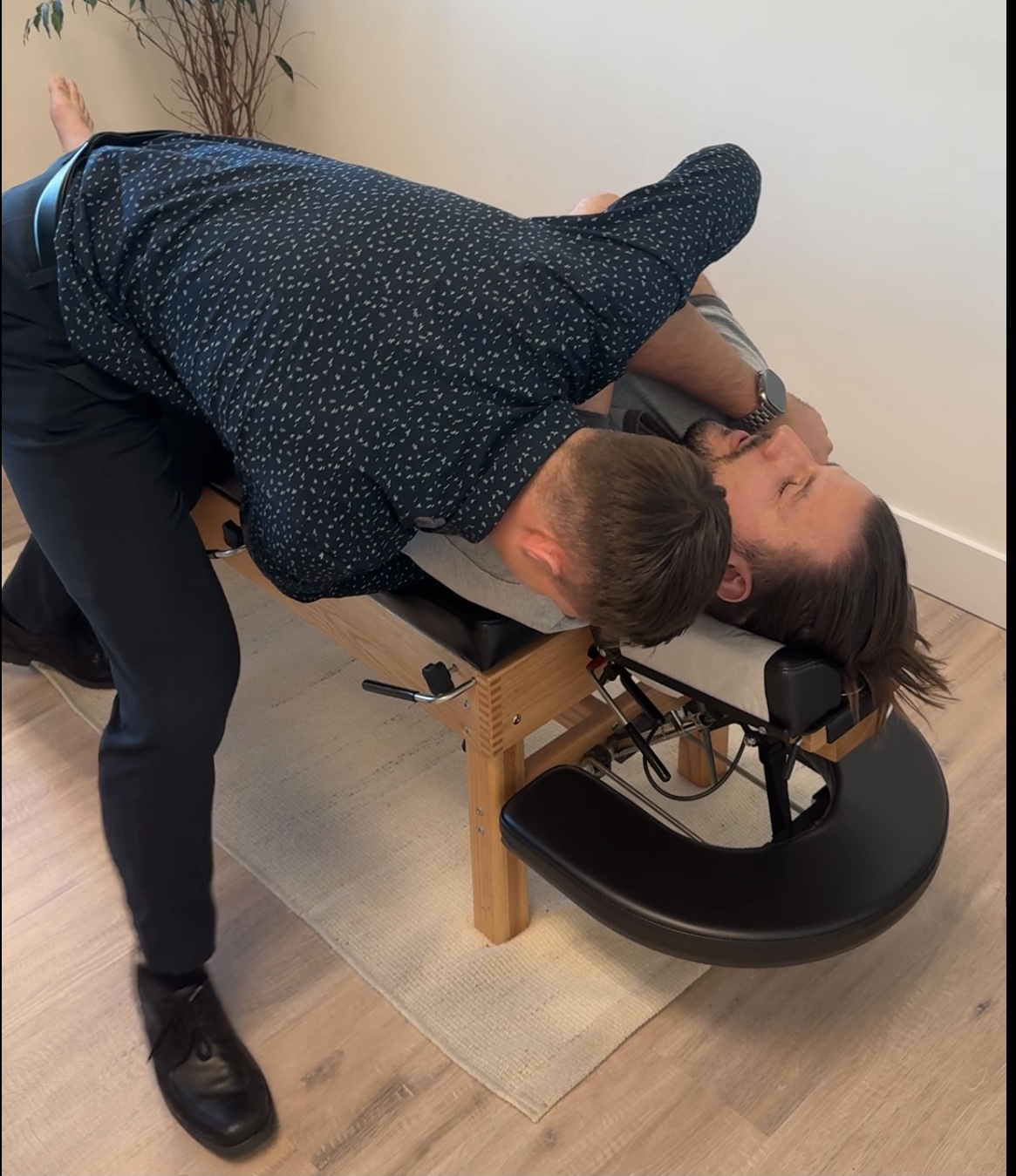November 4, 2025

Introduction: The Hidden Rib Connection Behind Shoulder Blade Pain
If you’ve been dealing with that nagging ache between your shoulder blades — the one that flares up after hours at your desk or while driving down the Gardiner — you’re not alone.
Many Toronto patients I see at Dr. Mateusz Krekora Chiropractic Clinic come in saying, “I’ve tried massage, foam rolling, and stretches — but nothing lasts.”
Here’s why: the real problem may not be your muscles at all. Often, the root cause lies underneath — in the small but crucial rib joints that connect to your spine.
The Problem: Why Shoulder Blade Pain Keeps Coming Back
When shoulder blade pain won’t go away despite soft tissue work, it’s often because the joint itself is restricted or irritated.
Each of your ribs attaches to your thoracic spine (the mid-back area) through a small, moveable joint. These costovertebral joints help your ribs move every time you breathe, twist, or reach overhead.
If one of these joints becomes restricted — due to poor posture, repetitive strain, or even one awkward movement — it can irritate the surrounding nerves and muscles. The result?
Even though it feels like a muscular problem, the underlying issue is often joint dysfunction, not muscle tightness.
Expert Insight: What I See in My Toronto Chiropractic Practice
At my downtown Toronto clinic, I often assess patients who say their “mid-back” or “shoulder blade” pain has been treated with massage or stretching — yet relief only lasts a few hours.
When I evaluate them, I frequently find restricted rib motion on one side of the spine. This restriction changes how the surrounding muscles, like the rhomboids and trapezius, have to work. They tense up to compensate for the lack of joint movement.
Think of it like trying to drive with your handbrake partially on — the engine (your muscles) works harder, but the car (your spine) doesn’t move properly.
The key insight is this: until the restricted rib joint is restored to its normal movement, the muscles will keep tightening back up.
How a Chiropractic Rib Adjustment Restores Normal Function
A chiropractic adjustment targets the irritated or “stuck” rib joint directly — restoring its natural motion and easing pressure on nearby nerves and muscles.
During a rib adjustment, I use a precise, controlled force at the site of restriction. Patients often describe an immediate sense of relief or “release” around their shoulder blade area.
This isn’t just about cracking joints — it’s about restoring biomechanical balance to the spine and rib cage.
According to the Canadian Chiropractic Association, spinal adjustments are a safe and effective way to improve joint motion and reduce musculoskeletal pain. While more research is ongoing, current evidence supports chiropractic care for thoracic spine dysfunction that contributes to mid-back and shoulder pain (PubMed study).
Once the joint starts moving properly again:
It’s a classic example of addressing the root cause, not just the symptoms.
Why Massage and Stretching Alone Often Fall Short
Massage, stretching, and foam rolling are excellent for temporary relief — they improve circulation and reduce muscle tension.
However, when the underlying joint remains restricted, the body simply reverts back to its dysfunctional pattern. Muscles tighten again to stabilize the irritated joint, perpetuating the pain cycle.
It’s like trying to loosen a door that squeaks — oiling the hinges helps, but if one hinge is bent (the joint), the squeak returns until it’s realigned.
That’s where the NeuroStructural Corrective Process we use at my clinic makes the difference. We identify which specific rib or vertebral segment is restricted and correct it, rather than chasing symptoms.
Local Lifestyle Factors in Toronto That Contribute
Living and working in downtown Toronto can make these rib restrictions more common than you might think.
Common contributing habits include:
Simple changes like mindful breathing, posture awareness, and periodic spinal movement breaks can help maintain results after an adjustment.
How We Treat Shoulder Blade Pain at Dr. Mateusz Krekora Chiropractic Clinic
At my Toronto clinic, we combine:
This integrative approach not only relieves shoulder blade pain but helps prevent it from coming back.
Conclusion: Get to the Root of Shoulder Blade Pain
If your shoulder blade pain keeps returning no matter how much you stretch or massage, it’s time to look deeper. A restricted rib joint may be the hidden cause — and chiropractic care can correct it safely and effectively.
At Dr. Mateusz Krekora Chiropractic Clinic in downtown Toronto, we specialize in finding and fixing these underlying issues so you can move freely and feel strong again.
👉 Book Your Free 20-Minute Case Review today and start feeling 25 again.
Disclaimer:
This article is for informational purposes only and should not be taken as medical advice. Please consult a licensed chiropractor before starting any treatment.
